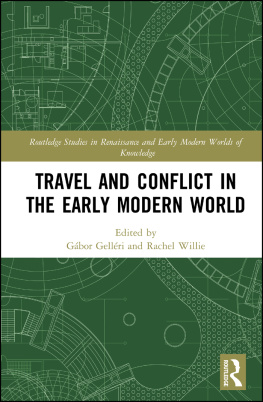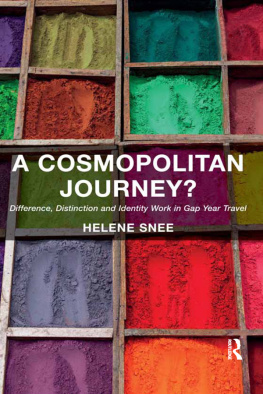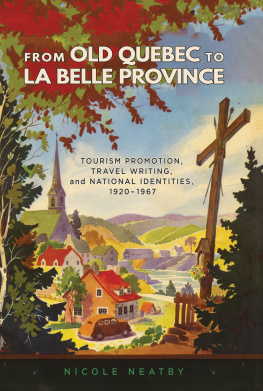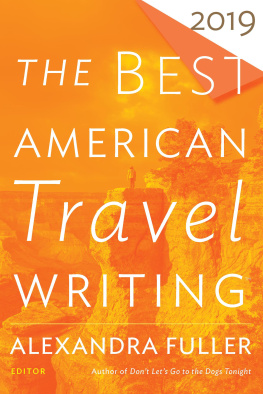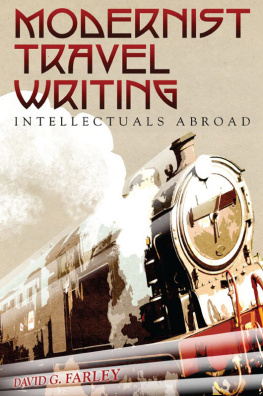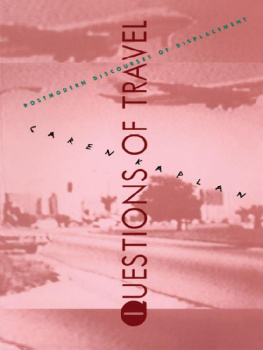TRAVEL, MODERNISM AND MODERNITY
To H.T.
Travel, Modernism and Modernity
ROBERT BURDEN
ASHGATE
Robert Burden 2015
All rights reserved. No part of this publication may be reproduced, stored in a retrieval system or transmitted in any form or by any means, electronic, mechanical, photocopying, recording or otherwise without the prior permission of the publisher.
Robert Burden has asserted his right under the Copyright, Designs and Patents Act, 1988, to be identified as the author of this work.
Published by
Ashgate Publishing Limited
Wey Court East
Union Road
Farnham
Surrey, GU9 7PT
England
Ashgate Publishing Company
110 Cherry Street
Suite 3-1
Burlington, VT 05401-3818
USA
www.ashgate.com
British Library Cataloguing in Publication Data
A catalogue record for this book is available from the British Library
The Library of Congress has cataloged the printed edition as follows:
Burden, Robert
Travel, modernism and modernity / by Robert Burden.
pages cm
Includes bibliographical references and index.
ISBN 978-1-4724-5286-3 (hardcover: alk. paper) ISBN 978-1-4724-5287-0 (ebook) ISBN 978-1-4724-5288-7 (epub)
1. Expatriate authorsCriticism and interpretation. 2. Authors, EnglishHistory and criticism. 3. Authors, AmericanHistory and criticism. 4. Travel in literature. 5. Cultural awareness. 6. Modernism (Literature) I. Title.
PN495.B87 2015
823.9120932dc23
2014042348
ISBN 9781472452863 (hbk)
ISBN 9781472452870 (ebk-PDF)
ISBN 9781472452887 (ebk-ePUB)
Contents
Acknowledgements
I would like to record here my thanks to former colleagues and friends who kindly agreed to read drafts of chapters as work-in-progress: Ben Knights, Bruce Ingraham and Stephan Kohl. Bruce Ingraham also generously read an early version of the whole manuscript. Their comments were invaluable in my moving the text towards greater coherence and cohesion. With the encouragement of Ann Donahue at Ashgate, the comments of the publishers anonymous reader, the sharp scrutiny of the text and argument by my wife, Hildegard Trger, and the thoroughness of the editorial team at Ashgate, I was able to get the book into its final shape. Any remaining faults are, of course, the sole responsibility of the author. Thanks also go to Charles Kenwright for the design of the cover image.
Cover image: Image of Edith Wharton: The New York Times/Redux/laif.
Images of Joseph Conrad, E.M. Forster, D.H. Lawrence and Henry James: Wissenmedia, Gtersloh, Germany.
Italian landscape: Charles Kenwright, www.openmind-images.com.
Introduction
Aim
This book is a study of the significance for modernist writing of travel. The writers selected as representative are Joseph Conrad, E.M. Forster, D.H. Lawrence, Henry James and Edith Wharton, since they travelled and produced travel writing to one degree or another and in some form or another. I look in some detail at the place of travel and travel writing in their respective work, work broadly conceived as modernist. For there is an effect of travel and travel writing on their fiction as narrative paradigm and as recurrent trope for questions of identity and otherness in the encounter with places and cultures. Perspectives gained from travel at home and abroad or simply the desire for expatriation spill over into the deep-seated concern with the emergent crisis of national cultural identity, Englishness or the new American identity. Thus the perceived depredations of modernity, together with the question of imperialism the older British and European, and the emergent American from the late nineteenth century and into the early twentieth frequently arises as a focus on tourism, which each of these selected writers disparage as the ruin of real travel, a problematic attitude at best, and one which stands for another sense of superiority to add to that of nationalism in the competitions of modernity. Indeed, it is sometimes as if the battle ground for the emergent collective feelings of racial superiority and its critique is the aesthetics of western High Culture against the ancient forms of so-called primitive cultures extreme positions that distinguish Henry James from D.H. Lawrence. The racial encounter is at the heart of modernity, and travelling modernists reconceived the dramas of encounter in the imperial field in, at best, an ambivalent perspective (Armstrong, 1369).
Key Concepts
Modernism
In discussing modernism, I join those who have been calling for a broader synthetic conceptualization (Armstrong, Modernism: A Cultural History; Levenson, Modernism). While recognizing the complexities of the critical formations of modernism both in its self-understanding and in the belated readings of critical approaches, I also insist on the variety of modernisms and the force of residual aesthetic discourses and codes of representation even while newer forms are emerging. Peter Gay writes about the ways in which modernist novelists enlisted long-established techniques for radical ends Henry James is his example who works within literary orthodoxy to achieve newer complexities in the exploration of consciousness (Modernism, 19094); and I would add Conrads impressionism
Where modernism is generally divided between early, high and late periods,
Modernity
It is generally agreed that any study of literary modernism requires an understanding of the concept of modernity: The notion that modernism involves a critique of the self-understanding of modernity construed in terms of the enlightenment project is, of course, essential to any theoretical understanding of modernism (Giles, Afterword in Theorizing Modernism, 178). The general response to modernity in the late nineteenth and early twentieth centuries was twofold. In the one camp, it was celebrated as a great advance in mans control over nature in technology and science (Futurism, Vorticism); in the other, it was condemned as a greater loss to the culture: a life empty of meaning as the instrumentalities, mass cultural formations and standardization of modernity were perceived as having swept away the traditional values that had given the self its senses of identity. However, a problem arises when modernity is understood as the liberation from tradition and prejudice, as David Punter defines it (Modernity, 210). Being modern has something to do with emancipation, greater freedom of movement (social mobility and travel) and opportunity; and questions of gender and sexuality are famously addressed by the modernists, more directly than their Victorian predecessors.
The modernist critique of modernity is represented by the writers examined in this study. Frisby quotes Siegfried Kracauer as representative of the anti-modernity position: the human being is a cog in a powerful soulless machine which rests upon the interlocking of countless little wheels. The goal that is striven for vanishes from the inner gaze (Fragments of Modernity, 113). Kracauers description is reminiscent of Mark Gertlers 1916 painting, The Merry-Go-Round, which impressed D.H. Lawrence because it articulates the mechanization and spiritual emptiness of modern existence.This characterization of modernity through the trope of the machine has had a long history. Alain Supiot writes:
Industrial societys imaginary represented the world as a clockwork mechanism, subject to the laws of Newtonian physics, and turned workers into the cogs of a giant productive machine. Following Taylorist precepts, they were subject in both capitalist and communist countries to a so-called scientific organization of labour, whose first principle was to prohibit them from thinking the dehumanization of labour was seen as the price of progress. (
Next page

